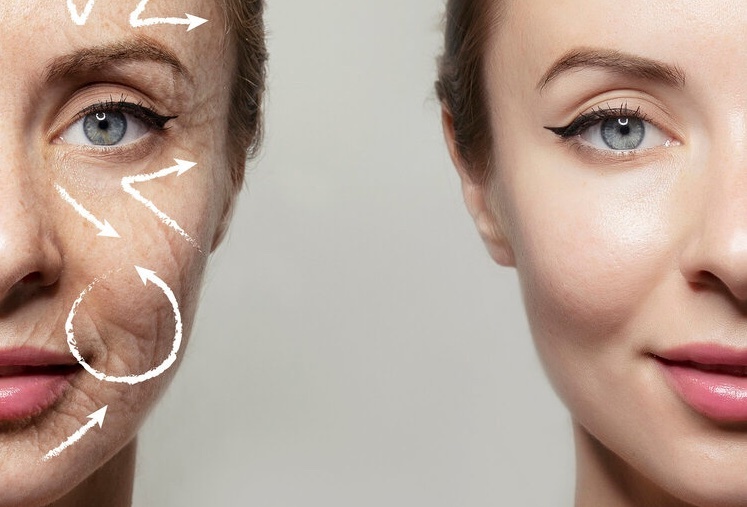Collagen is a structural protein found in the connective tissues of animals. It supports and strengthens body tissues, including bone, skin, tendons, ligaments, muscles, cartilage, and blood vessels. New research supporting the benefits of taking a collagen peptides supplement is surfacing, and it seems people realize how fantastic collagen is for internal and external health concerns. However, consumers may find it confusing when looking for an effective supplement with all the different varieties and sources of collagen available. One of the most commonly asked questions is: what's the difference between marine collagen and bovine collagen? We're here to break down the two collagen types to help you make the best decision for your health goals and concerns!

Why take a collagen supplement?
Collagen is the second most abundant substance in our bodies after water. Unfortunately, from our early 20s and on, the body's natural collagen production begins to decline by approximately 1.5% per year, meaning by the time we're 40, we are producing 25% less collagen. The decrease in collagen in our body can wreak havoc on the skin, joints, hair, and nails and impact digestional health. A range of factors can trigger decline, for example, environmental toxins, poor nutrition, exposure to harmful UV rays, and compromised sleep quality.
Taking a regular collagen supplement can help achieve overall wellness, including glowing skin, improved skin elasticity, better gut health, and long, shiny hair. Recent studies have shown that collagen can also reduce inflammation, enhance sleep quality, and help regenerate cartilage.
A few studies have shown that taking amino acids (hydrolyzed collagen) can help regrow hair. In one study, a group of volunteers who took a cysteine supplement for 50 weeks experienced a 50% increase in hair growth. In another study, a combination of L-cystine and other ingredients improved hair growth in women with hair loss. In a third study, women taking a variety of other amino acids (lysine) and iron experienced a decrease in hair shedding.
What are the different collagen types?
While there are over 16 types of collagen, the most plentiful ones are Type I, II, III, and IV.
- Type I is the most abundant collagen type in the human body. It makes up the hair, bones, skin, teeth, ligaments, and tendons. It also contributes to hair thickness, skin clarity and helps to minimize hair loss. It's a critical structural aspect of several tissues and bodily functions.
- Type II: This collagen type makes up the joint cartilage and supports knees, back, jaw, and other joints to keep you feeling agile, strong, and flexible.
- Type III: Makes up the connective tissue of organs and muscles and is essential for maintaining and repairing the body. It improves the elasticity properties in ligaments and tendons that begin declining with age.
- Type IV: This is the less common type of collagen. It aids in the filtration of kidneys and other organs. It helps to support skin health and may also help with wound healing and digestion.
What is the difference between marine and bovine collagen supplements?
The main difference between the two collagen supplements is not just the source of the collagen. The animal's environment can play a significant role in the quality of the supplement.
Bovine collagen is usually a by-product of cows' hides processing. If the collagen from the hides weren't turned into gelatin or hydrolyzed collagen, it would just get thrown away. It contains Collagen type I and III and is used to help with bone and joints, skin, and nails health.
Marine collagen comes from fish and has a smaller particle size than all the other collagen types.
Marine collagen is the best source of Collage type I. Collagen type I makes up 80 percent of our skin and works with elastin to help structure the skin, supporting hair follicles. Due to the smaller molecular size of hydrolyzed marine collagen, marine collagen is absorbed 1.5 times better than bovine collagen and dissolves better in cold and warm drinks. The marine collagen derived from wild-caught deep-sea fish is regarded as the highest quality collagen.
What are the benefits of marine collagen supplements?
Fish collagen, or marine collagen, is primarily collagen Type I. This type of collagen is most effective in rebuilding and healing the body. For a long time, it's been used in the cosmetic industry for its skin-enhancing benefits. Taking marine collagen is an excellent option for pescatarians and those who do not consume beef products.
Better, healthier, and stronger hair, glowing skin, and stronger nails
Marine collagen is better for the hair and skin than bovine collagen. If you've tried countless skincare products and regimens with no results, it's likely that your skin issue is internal and can be fixed through an improved diet and collagen supplementation. Marine collagen helps provide a foundation for healthy, radiant skin. It can clear up blemishes, minimize wrinkles, and improve skin elasticity to give a plump, youthful glow.
Higher bioavailability
Marine collagen is the purest form of collagen, and compared to bovine collagen, it is more bioavailable. The higher bioavailability means it can be more quickly absorbed into the body, helping to show results faster!
Cleaner source of collagen
Land animals have a much higher risk of contamination through hormones and disease than ocean animals. Wild-caught marine collagen is the cleanest form of collagen available and is typically regarded as the safest variety.
Better for the environment
When ethically sourced, marine collagen is a better choice for the environment. Parts of the fish that would otherwise go to waste are used to make supplements.

What are the benefits of bovine collagen supplements?
Bovine, or beef collagen, is the most common source of collagen in supplements. It's mainly made up of Type I and Type III collagen, both of which play a significant role in the repair and growth of bones, ligaments, tendons, and skin. When looking for a high-quality beef collagen supplement, look for grass-fed options.
Cost-effective
Bovine collagen is more cost-effective than marine collagen and widely available at health and grocery stores. It's also a great choice if you have any shellfish allergies!
Great for joint pain
Bovine collagen can help with osteoarthritis and common joint pain by stimulating cartilage production to cushion joints. Higher-quality collagen in the joints can help minimize pain and stiffness in knees, hands, hips, elbows, and other body parts.
Improve gut health
High levels of stress, poor nutrition, and various food sensitivities can damage the tissue lining of the intestines, leading to several unwanted problems, including a "leaky gut." When this happens, foreign particles can enter the bloodstream through the digestive tract and wreak havoc on the body, causing inflammation and increased risk for autoimmune diseases. By repairing microscopic holes in the gut lining, bovine collagen can help to reduce symptoms of leaky gut and other digestive disorders such as IBS and Chrons.
Promotes deeper sleep
The most abundant amino acid in bovine collagen, glycine, have improved sleep quality in those who consume it before bed. It's also suggested that glycine can manage core body temperature and regulate blood sugar levels, which is associated with better sleep.
Conclusions:
Marine collagen might be a better choice for those wanting faster results, those with hair, skin, and nail concerns, and those that don't eat cow products. On the other hand, bovine is slightly cheaper and might be the better choice for those with gut problems.
Best collagen supplements for hair regrowth
Shop Marine Collagen
References
- In combination with resistance training, a randomized controlled trial, Collagen peptide supplementation improves body composition and increases muscle strength in elderly sarcopenic men.
- L-Glutamate supplementation improves small intestinal architecture and enhances the expressions of jejunal mucosa amino acid receptors and transporters in weaning piglets.
- New therapeutic strategy for amino acid medicine: glycine improves the quality of sleep
- A 24-Week study on the use of collagen hydrolysate as a dietary supplement in athletes with activity-related joint pain
Find the most effective hair growth products for you by taking the free hair assessment.




